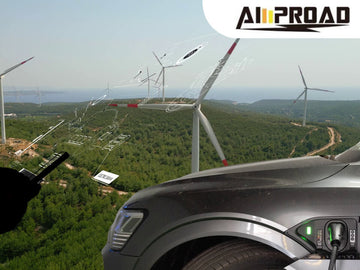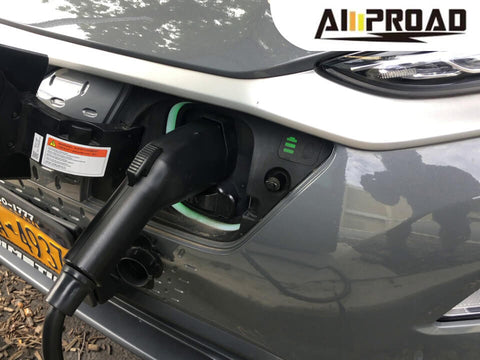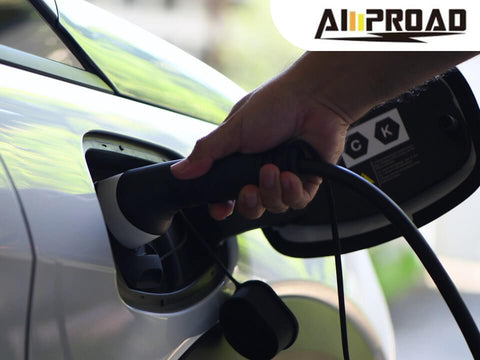
As electric vehicles (EVs) surge in popularity, the need for convenient charging solutions grows. Home EV chargers play a pivotal role in meeting this demand, providing owners with a reliable and accessible means to power their vehicles. But what factors should you consider when installing one? From understanding the rising tide of EV adoption to recognizing the vital role home chargers play, it's essential to delve into the key considerations. In this article, we'll explore the factors crucial to installing a home EV charger seamlessly. By examining aspects like location, electrical capacity, cost, and future-proofing, you'll gain valuable insights to make informed decisions about your charging infrastructure.
What Types of Home EV Chargers Are Available?
Explanation of Different Types of Home EV Chargers
When considering home EV chargers, it's crucial to understand the available options. The two primary types are Level 1 and Level 2 chargers, each offering distinct features and charging capabilities.
Level 1 EV chargers are the most basic option, often included with electric vehicles upon purchase. These chargers utilize a standard household outlet (120 volts) and are straightforward to use. However, they provide relatively slow charging speeds, typically adding around 2 to 5 miles of range per hour. While Level 1 chargers are convenient for overnight charging or topping up the battery during the day, they may not be suitable for drivers who require frequent or rapid charging.
On the other hand, Level 2 EV chargers offer significantly faster charging speeds compared to Level 1 chargers. These chargers require a dedicated 240-volt circuit and are commonly installed in residential garages or driveways. Level 2 chargers can deliver charging rates ranging from 10 to 60 miles of range per hour, depending on factors such as the charger's power output and the vehicle's onboard charger capacity. With Level 2 chargers, drivers can fully charge their vehicles in a matter of hours, making them ideal for daily use and longer trips.
Overview of the Charging Speeds and Capabilities of Each Type
The charging speeds and capabilities of Level 1 and Level 2 EV chargers vary significantly, making it essential to choose the right option based on your specific needs and preferences.
Level 1 chargers, while convenient and easy to use, offer relatively slow charging rates compared to Level 2 chargers. With charging speeds averaging 2 to 5 miles of range per hour, Level 1 chargers are best suited for overnight charging or topping up the battery during downtime.
In contrast, Level 2 chargers provide much faster charging speeds, making them a more practical choice for drivers with higher charging demands. With charging rates ranging from 10 to 60 miles of range per hour, Level 2 chargers can fully recharge an electric vehicle in a fraction of the time compared to Level 1 chargers. This makes Level 2 chargers ideal for daily commuting, longer trips, and situations where rapid charging is required.
Importance of Selecting the Right Charger for Your Needs and Budget
When choosing a home EV charger, several factors should be taken into account to ensure it meets your specific requirements and budget constraints. First and foremost, consider your charging needs and preferences. Evaluate how frequently you'll be charging your electric vehicle and the desired charging speeds. If you have a daily commute or frequently travel longer distances, a Level 2 charger may be the most practical option due to its faster charging capabilities. Additionally, factor in the installation costs associated with each charger type.
While Level 1 chargers typically require minimal installation, Level 2 chargers may necessitate electrical upgrades and professional installation, leading to higher upfront costs. Long-term benefits should also be considered when selecting a home EV charger. While Level 2 chargers may require a larger initial investment, they offer faster charging speeds and increased convenience, potentially enhancing the overall ownership experience and resale value of your electric vehicle. One option to consider is the AMPROAD versatile Level 1 and Level 2 dual-purpose portable EV charger, which offers affordability and flexibility for both home and travel charging needs. By carefully weighing these factors and selecting the right home EV charger, you can ensure efficient and reliable charging for your electric vehicle while staying within your budget constraints.
How to Select the Location and Placement?
Before installing your home EV charger, carefully assess the location to ensure it meets your charging needs while complying with local regulations.
Considerations for Selecting the Optimal Location for the Charger
Start by identifying potential locations for the charger, considering factors such as accessibility, visibility, and weather protection. Ideally, the charger should be located near your parking space for easy access.
Factors to Consider When Determining the Placement of the Charger
Once you've identified potential locations, consider additional factors such as proximity to the electrical panel and the parking space where your electric vehicle will be parked. Ensure there is sufficient space for the charger and that it is easily accessible for both installation and future maintenance.
Importance of Complying with Local Building Codes and Regulations
Before installing the charger, familiarize yourself with local building codes and regulations governing the installation of EV charging equipment. Ensure that the selected location and placement comply with these regulations to avoid any legal or safety issues down the line.
By carefully considering these factors and selecting the optimal location and placement for your home EV charger, you can ensure convenient and safe charging for your electric vehicle. Additionally, consulting with a qualified electrician can provide valuable insights and ensure that the installation is done correctly and in compliance with local regulations.
Electrical Capacity and Upgrades
Ensuring that your home has the necessary electrical capacity to support the installation of a home EV charger is essential for safe and efficient charging.
Assessment of the Home's Electrical Capacity and Compatibility with EV Charging
Begin by assessing your home's electrical capacity and compatibility with EV charging. Determine if your electrical panel has sufficient capacity to support the addition of a home EV charger without overloading the system. Consider factors such as the amperage of your electrical service and the availability of dedicated circuits for EV charging.
Potential Need for Electrical Upgrades to Support the Installation of a Home EV Charger
Depending on the electrical capacity of your home, you may need to make electrical upgrades to support the installation of a home EV charger, especially if you opt for a Level 2 charger. Upgrades may include installing a higher amperage electrical panel or adding dedicated circuits for EV charging to prevent overloading the existing electrical system.
Importance of Consulting with a Qualified Electrician to Assess Electrical Needs and Ensure Safety
To determine the necessary electrical upgrades and ensure the safe installation of a home EV charger, it's crucial to consult with a qualified electrician. An electrician can assess your home's electrical capacity, recommend any necessary upgrades, and ensure that the installation is done safely and in compliance with local electrical codes and regulations.
While installing a Level 2 EV charger may require additional electrical upgrades, it offers faster charging speeds and increased convenience compared to Level 1 chargers. By consulting with a qualified electrician and making any necessary electrical upgrades, you can ensure that your home is equipped to support the installation of a Level 2 EV charger safely and efficiently.
Are Home EV Chargers Cost-Effective?
Installing a home EV charger involves various costs that need to be considered to ensure it fits within your budget.
Breakdown of the Costs Associated with Installing a Home EV Charger
The costs associated with installing a home EV charger typically include the price of the charger itself, installation fees, and potential electrical upgrades. Level 1 chargers are usually less expensive than Level 2 chargers, but they offer slower charging speeds. Level 2 chargers may require additional electrical work, leading to higher installation costs.
Considerations for Budgeting and Financing Options
When budgeting for a home EV charger, explore financing options and incentives available in your area. Many utility companies offer rebates or incentives for installing EV chargers, helping offset the initial costs. Additionally, some municipalities or states provide financial incentives or tax credits for EV charger installations. Consider taking advantage of these programs to reduce your out-of-pocket expenses.
Importance of Evaluating the Long-Term Savings and Benefits of Home EV Charging
While the upfront costs of installing a home EV charger may seem significant, it's essential to evaluate the long-term savings and benefits. Home charging is typically cheaper than public charging stations such as Tesla destination charger, saving you money on fuel costs over time. Additionally, having a home EV charger provides convenience and flexibility, allowing you to charge your vehicle overnight or whenever it's most convenient for you. Consider the potential savings on fuel and the added convenience when evaluating the overall cost-effectiveness of installing a home EV charger.
By carefully considering the costs associated with installation, exploring financing options and incentives, and evaluating the long-term savings and benefits, you can ensure that installing a home EV charger aligns with your budget and provides value for your investment.
Key Considerations and Recommendations for Home EV Charger Installation
In this article, we've explored the critical factors to consider when installing a home EV charger. We discussed the different types of chargers available, including Level 1 and Level 2 chargers, and highlighted the importance of selecting the right charger based on your charging needs and budget. Additionally, we delved into the significance of selecting the optimal location and placement for the charger, ensuring compliance with local building codes and regulations. We also addressed the assessment of your home's electrical capacity and the potential need for electrical upgrades to support the installation. Furthermore, we discussed the breakdown of costs associated with installing a home EV charger and explored budgeting and financing options to help offset expenses.
Installing a home EV charger requires careful planning and consideration to ensure a successful and cost-effective installation. By taking the time to evaluate your charging needs, assess your home's electrical capacity, and research available options, you can make informed decisions that align with your budget and requirements. Additionally, thoughtful planning helps maximize the long-term benefits of home EV charging, such as convenience and cost savings on fuel.
Before proceeding with the installation of a home EV charger, it's crucial to consult with professionals, such as electricians and EV charging experts, to assess your specific needs and ensure a safe and compliant installation. Additionally, thorough research into available chargers, installation requirements, and incentive programs can provide valuable insights to guide your decision-making process. By seeking expert advice and conducting thorough research, you can confidently navigate the installation process and enjoy the benefits of home EV charging.
FAQs / People Also Ask
Q1: What electrical upgrades might be needed for installing a home EV charger?
A1: Depending on your home's electrical capacity, you may need to make upgrades to support the installation of a home EV charger, especially for Level 2 chargers. This may include installing a higher amperage electrical panel or adding dedicated circuits for EV charging.
Q2: How much does it cost to install a home EV charger?
A2: The costs associated with installing a home EV charger vary depending on factors such as the type of charger, installation fees, and potential electrical upgrades. Level 1 chargers typically have lower upfront costs compared to Level 2 chargers, which may require additional electrical work.
Q3: Are there any incentives or rebates available for installing a home EV charger?
A3: Many utility companies, municipalities, and states offer rebates, incentives, or tax credits for installing EV chargers. Additionally, some electric vehicle manufacturers may provide incentives for home charger installations. It's essential to research available incentives in your area to offset installation costs.




